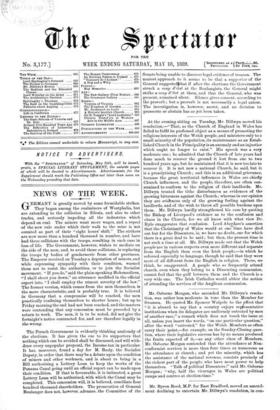At the evening sitting on Tuesday, Mr. Dillwyn moved his
resolution,—" That, as the Church of England in Wales has failed to fulfil its professed object as a means of promoting the religious interests of the Welsh people, and ministers only to a small minority of the population, its maintenance as an Estab- lished Church in the Principality is an anomaly and an injustice which ought no longer to exist." His speech was a very moderate one ; he admitted that the Church of late years had done much to recover the ground it lost from one to two hundred years ago, but he maintained that it is now too late to recover it. It is not now a national Church, he said, but it is a proselytising Church ; and this is an additional grievance, because the great territorial influences in Wales are chiefly Church influences, and the people, therefore, are often con- strained to conform to the religion of their landlords. Mr. Dillwyn treated the tithe disturbances as evidences of the growing bitterness against the Church ; whereas in our opinion they are evidtnces only of the growing feeling against the landlords, and of the wish to throw all possible burdens upon them. Mr. Dillwyn hardly strengthened his case by quoting the Bishop of Liverpool's evidence as to the confusion and chaos in the Church, for we all know with what view Dr. Ryle exaggerates that confusion. Lord Aberdare's assertion that the Christianity of Wales would at one time have died out but for the Dissenters, is, we have no doubt, one for which there is a great deal to be said ; but then, the present time is not such a time at all. Mr. Dillwyn made out that the Welsh people are in various respects even more different and separate from the English than even the Irish people,—in which he referred especially to language, though he said that they were most of all different from the English in religion. There, we think, he exaggerated. A people who so frequently attend church, even when they belong to a Dissenting communion, cannot feel that the gulf between them and the Church is a very wide one. The Irish Catholics would abhor the notion of attending the services of the Anglican communion.


































